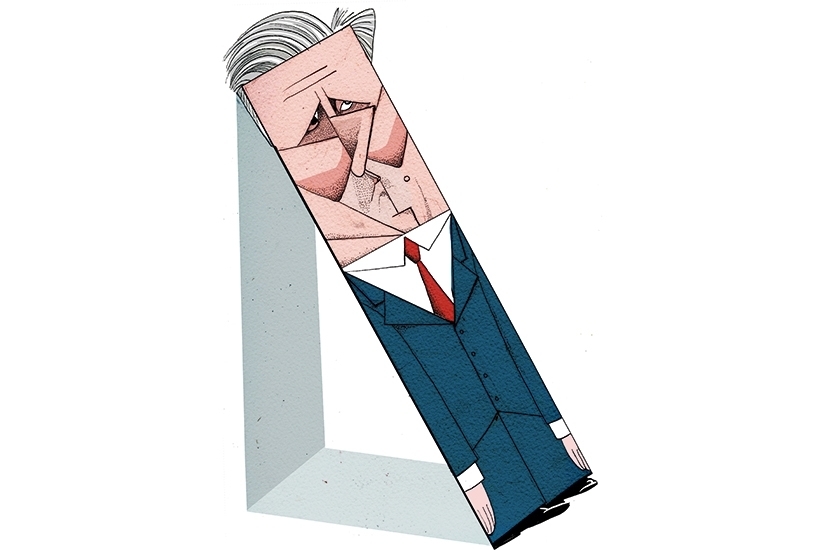If it’s No Deal, then it will usher in a crisis that will highlight the leader’s negative baggage and remind everyone why he should never be trusted, probably dooming him to ignominious defeat at the next election.
If that is your view of the post-transition political landscape then I heartily agree. But, like most of the punditry, I bet you’ve got the wrong leader in mind. Because the man who will actually be holed below the waterline is Keir Starmer, not Boris Johnson. Let me explain by going through what No Deal will mean for each leader.
Certainly a No Deal end to the Brexit transition is likely to be accompanied by bumpy times during the ensuing adjustment, including queues at ports and even shortages of particular products. It is therefore by no means guaranteed that Johnson won’t take a short-term hit from all this in the eyes of some potential Tory voters.
The formula is well-established: lower growth, higher unemployment, pressure on living standards and the undershooting of expectations usually add up to voter scratchiness.
Yet even that temporary hit may well not happen. Why? Because voters will see that Johnson did his best to reach a deal but had the bottle to walk away when the EU was only prepared to offer terms that would have humiliated Britain and betrayed the instruction given by the people in the referendum of 2016. In the eyes of many, Johnson’s standing will therefore actually be enhanced.
Another factor to be weighed in the balance, as far as Boris Johnson is concerned, is that Britain’s success in rolling out a Covid vaccination programme ahead of the game means that UK economy is going to be roaring ahead by the spring of 2021. The idea that a couple of additional percentage points are being lost from GDP because of trade friction with the EU is liable to be lost in the great rebound boom. ‘We would be growing even faster had we taken a knee to Brussels in December’ is hardly likely to prove a clinching argument for Starmer.
And the habit of some to catastrophise in advance the likely impact of No Deal – we’ll end up living in caves and eating mud, don’t you know? – means that the relatively minor actual effects may turn into a source of relief and even mockery; second home owners needing a visa if they intend to spend more than 90 consecutive days in Tuscany, more expensive white Burgundy, that sort of thing.
And there could easily be a jobs-boosting substitution effect as UK consumers switch from overseas to domestic produce, both as a response to price signals and out of patriotic endeavour, particularly if Johnson talks up a ‘buy British’ campaign.
So now let’s look at what it will all mean for Starmer. After Wednesday’s PMQs, he is committed to arguing that No Deal is a disaster and that Johnson should have taken the terms on offer.
This means that, in the years ahead, he will be stuck with arguing that it is in the national interest to surrender to the sovereignty-destroying level playing field demands of Brussels in return for easier trade. Even if he does not explicitly carry on calling for this it will quite fairly be assumed to be his underlying posture.
Meanwhile, the UK private sector will just get on with adjusting to the new terms of trade – seeking out what were hitherto ‘second best’ alternative markets and exploiting any potential new ones being opened up by the energetic Liz Truss.
Yet we will approach the next general election with our EU relations again a huge political issue, unresolved between the parties. Labour, the Lib Dems, the SNP and smaller leftish parties will all either be openly agitating or presumed to be secretly preparing to tie Britain back into the Brussels orbit.
Eurosceptic voters in Labour’s lost Red Wall seats will detest that idea. And pragmatic voters who long ago tired of the Brexit wars will think: ‘Let’s not open up that can of worms again.’ If Starmer tries to play down the issue then the Tories need only remind voters that he promised to respect the referendum result at the 2017 election but soon broke his word and started campaigning to overturn it. All his negative baggage from the Brexit era will tumble out into the street.
The only way Starmer could hope to quash this is by explicitly stating that he would not enter into any fresh treaty with the EU. But that would be tantamount to admitting that he had called things wrong and the PM had called them right during the great No Deal crisis of early 2021 – a disastrous position for a leader of the opposition going into a general election.
And just by having to talk about the EU all the time, he would remind a huge swathe of his target voters why they had earlier resolved never to vote for him.
In terms of the raw politics, it is Labour and not the Conservatives that needs a messy and fudged deal to keep the UK at least partially enmeshed in the Brussels way of doing things. If Boris Johnson doesn’t blink then Keir Starmer becomes unelectable.







Comments